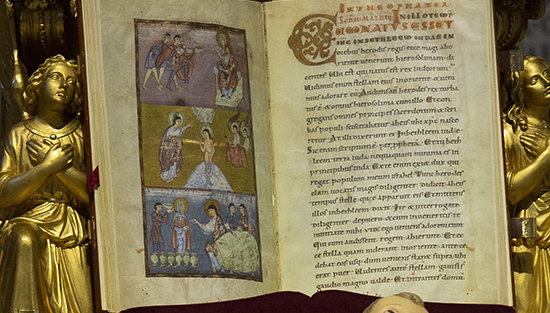The book of Wisdom narrates God's love for sinful men: "You have compassion on all, for you can do all things, and you overlook the sins of men so that they may repent", and explains his method: "You correct little by little those who fall". Jesus makes this merciful love visible also in his encounter with Zacchaeus in Jericho, which is the last personal encounter with Jesus that Luke narrates before his entry into Jerusalem for his passion. Shortly before that rich man had gone away sad, and Jesus had remarked that it was difficult for a rich man to enter the kingdom of God, but that for God even this was possible. The conversion of Zacchaeus is a confirmation. Luke presents him as a "chief tax collector", a man on the cusp of professional success and belonging to a category hated by the chosen people. For his part, he has the desire to see who Jesus is, and he shows himself free from the possible mockery or criticism of his fellow citizens: he climbs a leafy tree. His action is defined with verbs of motion: "He sought to see, he ran, he climbed", but the action of seeing, by which he climbed the sycamore tree, is said only of Jesus, who "lifted up his eyes". Because the look of Jesus comes before. Zacchaeus did not know him, Jesus anticipates him, calling him by name because he has always known him.
Jesus' gaze upon us is constant, his calling us by name and his invitation to live with him in intimacy happens "today", a reflection in time of the everlasting of eternity: "Today I must stay in your house... Today has been the salvation of this house". To our timid attempt to approach, perhaps out of curiosity, he responds with a look of love, with the knowledge of our name and the self-invitation to eat with us. "It is necessary" translates the verb "deo", with which Jesus manifests that the Father's design must be fulfilled. He must be about his Father's business, he must suffer at the hands of the rulers of the people... And he must seek the lost sheep: he has come for sinners.
The method he activates is not that of preaching or exhortation: he does not ask Zacchaeus for conversion as a condition for entering his house: he goes with him and towards him, a sinner on the way, and with his friendly presence, his gaze that reveals that of the Father, his sympathy, his non-public condemnation of his sin, he opens Zacchaeus' heart to conversion. This is not only made up of feelings, but of concrete and visible gestures of restitution and almsgiving, of attention to those same poor people he had previously robbed. As Paul writes to the Thessalonians, it is God who works good in us, and for this reason he asks: "That our God may make you worthy of your calling, and by his power bring to completion every purpose to do good".
Homily on the readings of Sunday XXXI
The priest Luis Herrera Campo offers its nanomiliaa small one-minute reflection for these readings.









